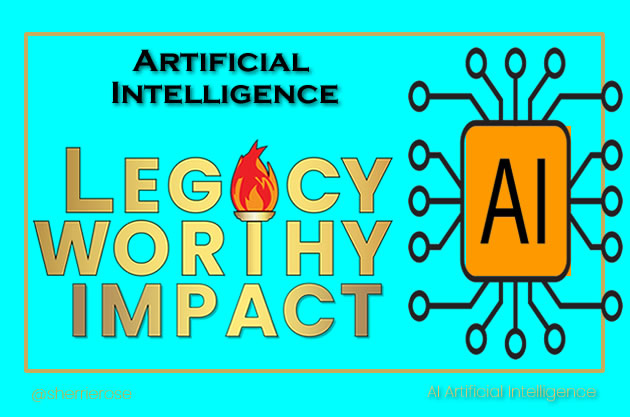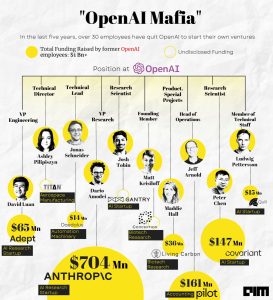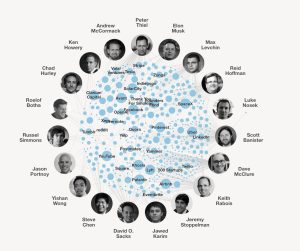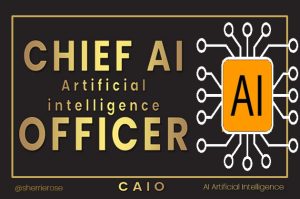AI’s Legacy Worthy Impact: Artificial Intelligence (AI)

AI’s Legacy Worthy Impact: Artificial Intelligence (AI)
The legacy worthy impact of Artificial Intelligence AI showed up in January 2023 with 100 million monthly users indicating the highest adoption of the (free) software application, ChatGPT from Open AI. The AI chatbot ChatGPT has had groundbreaking impact on technology with its mega-popularity in just a matter of weeks 100 million monthly active users only two months after its launch in late November 2022 is a legacy worthy statistic, according to data from Similarweb making Artificial Intelligence ChatGPT the fastest growing web platform, EVER and —much faster than social media platforms TikTok or Instagram!
As the technology continues to improve, we can expect to see even more advanced and sophisticated AI language models that can help businesses and individuals automate tasks, improve efficiency, and enhance the user experience in a wide range of applications.
What is OPEN AI and why should I care?
OpenAI is an Artificial Intelligence AI research organization founded in 2015 by a group of prominent technology leaders including Elon Musk, Sam Altman, and Greg Brockman, among others. The goal of OpenAI is to create advanced AI technologies that benefit humanity as a whole, while minimizing potential risks and ensuring the technology is safe and ethical.
OpenAI is known for developing some of the most advanced Artificial Intelligence AI models and tools, including the GPT series of language models, which are capable of generating human-like language in a wide range of applications. These models have been used for a variety of purposes, from generating creative writing and poetry to improving language translation and language understanding in virtual assistants.
As a person, you may not necessarily need to care about OpenAI specifically, but you can benefit from the innovations and advancements in artificial intelligence that organizations like OpenAI are working on. AI has the potential to transform many industries, from healthcare to finance to education, and can help solve some of the world’s most pressing challenges. However, it’s important to ensure that AI is developed and used ethically and responsibly, which is where organizations like OpenAI play an important role.
What is CHAT GPT and why should I care?
ChatGPT (Generative Predictive Text) is a large language model developed by OpenAI that is capable of generating human-like responses to text inputs. As a language model, it has been trained on massive amounts of text data and can understand and respond to a wide range of topics and questions.
You may find ChatGPT useful if you have a question or are looking for information on a specific topic. It can also be used for entertainment purposes, such as generating creative writing prompts or generating fun and interesting responses to chat conversations.
As an Artificial Intelligence AI-powered tool, ChatGPT is an example of how artificial intelligence is advancing and transforming the way we interact with technology. In the future, we can expect more advanced AI tools and applications that can help solve complex problems and improve our lives in many ways. So, while you may not necessarily need to care about ChatGPT specifically, it’s important to stay informed about AI technology and its potential impact on society.
The Artificial Intelligence technology that powers ChatGPT is being used in a wide range of applications, from chatbots and virtual assistants to automated content creation and data analysis.
Why ChatGPT is an internet sensation
ChatGPT has become an internet sensation for several reasons. One of the main reasons is that it is capable of generating human-like responses to text inputs, making it feel like you are having a conversation with another person. This has led to many entertaining and sometimes amusing interactions with ChatGPT, which people have shared on social media and other online platforms.
Another reason for ChatGPT’s popularity is its versatility. It can be used for a wide range of applications, from generating creative writing prompts to answering complex questions and helping people solve problems. This Artificial Intelligence AI versatility has made it popular among a diverse range of people, from writers and creatives to students, researchers, and even businesses.
Additionally, ChatGPT has been featured in a number of high-profile media outlets, which has helped to increase its visibility and popularity. As people become more familiar with Artificial Intelligence AI technology and its potential applications, it’s likely that ChatGPT and other AI language models will continue to gain even more popularity and influence in the future.
What jobs will emerge with the prevalence of Artificial Intelligence (AI) technology?
The prevalence of Artificial Intelligence (AI) technology is expected to bring significant changes to the job market. While some jobs may become obsolete, new jobs are likely to emerge as a result of the increased use of AI technology in various industries. Below are a few examples of jobs that may emerge with the prevalence of AI technology:
- Chief AI Officer: Chief AI Officer (CAIO) Chief AI Officer (CAIO) Hiring a CAIO is complex because the flexibility of AI omits the possibility of a one-size-fits-all approach.
- AI Ethicist: As the use of AI becomes more widespread, there will be a need for professionals who can ensure that the technology is developed and used ethically and responsibly.
- AI Trainers: As AI becomes more advanced and specialized, there will be a need for professionals who can train and fine-tune the technology to perform specific tasks.
- Data Analysts: With the vast amount of data that AI generates, there will be a need for professionals who can analyze and interpret that data to derive insights and inform decision-making.
- Automation Specialists: As more tasks become automated through the use of AI, there will be a need for professionals who can design and implement those systems.
- Robot Interaction Specialists: With the development of more advanced robots and other autonomous systems, there will be a need for professionals who can design and implement the human-robot interaction to ensure safe and efficient collaboration.
- Cybersecurity Specialists: As AI becomes more prevalent, there will be an increased need for professionals who can protect these systems and networks from cyber threats.
OpenAI jobs https://openai.com/careers/
Other careers will emerge with the prevalence of AI technology. As the technology continues to advance and new applications emerge, there will likely be many more jobs created that have yet to be anticipated.
Who are the top “players” in the AI Artificial Intelligence Space?
The AI Artificial Intelligence Space is a rapidly evolving field, with many organizations and individuals making significant contributions. Here are some of the top players in the space:
- Google: Google is one of the leading companies in the AI space, with a number of AI-powered products, including Google Assistant, Google Translate, and Google Photos.
- Microsoft: Microsoft is another major player in the AI space, with a focus on developing AI-powered services such as Azure Machine Learning and Microsoft Cognitive Services.
- IBM: IBM is a leader in the development of AI systems, with its Watson platform being one of the most well-known AI platforms in the industry.
- Facebook: Facebook uses AI for a variety of purposes, including content moderation, facial recognition, and personalized advertising.
- Amazon: Amazon is a leader in the use of AI for recommendation engines and other customer-facing applications.
- NVIDIA: NVIDIA is a leading provider of hardware for AI applications, with its GPUs being widely used for deep learning and other AI tasks.
- OpenAI: OpenAI is a non-profit research organization focused on advancing AI in a safe and beneficial way. 2015–2023
- Baidu: Baidu is a Chinese tech giant that has made significant investments in AI research and development.
- Tesla: Tesla is a company that is focused on developing autonomous driving technology, which relies heavily on AI and machine learning.
- DeepMind: DeepMind is a UK-based AI research company that is focused on developing advanced AI systems for a range of applications. It is now part of Google.
Who are the top PEOPLE in the AI Artificial Intelligence Space?
The AI Artificial Intelligence Space is home to many talented individuals who have made significant contributions to the field. Here are some of the top people in the AI space:
- Geoffrey Hinton: Geoffrey Hinton is a computer scientist and one of the pioneers of deep learning. He is a professor at the University of Toronto and a researcher at Google Brain.
- Yann LeCun: Yann LeCun is a computer scientist and one of the pioneers of convolutional neural networks, a type of deep learning model widely used in computer vision. He is a professor at New York University and a researcher at Facebook AI Research.
- Yoshua Bengio: Yoshua Bengio is a computer scientist and a leading expert in deep learning. He is a professor at the University of Montreal and a researcher at Mila, a Montreal-based AI research institute.
- Andrew Ng: Andrew Ng is a computer scientist and entrepreneur who has made significant contributions to the development of deep learning. He is a co-founder of Google Brain and a co-founder of the online learning platform Coursera.
- Fei-Fei Li: Fei-Fei Li is a computer scientist and a leading expert in computer vision. She is a professor at Stanford University and a co-founder of AI4ALL, an organization focused on increasing diversity and inclusion in AI.
- Demis Hassabis: Demis Hassabis is a computer game designer and entrepreneur who is the co-founder and CEO of DeepMind, a UK-based AI research company.
- Ian Goodfellow: Ian Goodfellow is a computer scientist who is best known for his work on generative adversarial networks (GANs), a type of deep learning model widely used in image and video generation. He is a researcher at Apple.
- Kai-Fu Lee: Kai-Fu Lee is a computer scientist and entrepreneur who has made significant contributions to the development of speech recognition technology. He is the founder of Sinovation Ventures, a venture capital firm focused on AI and tech startups.
- Cynthia Breazeal: Cynthia Breazeal is a computer scientist and roboticist who is known for her work on social robots. She is a professor at MIT and the founder and chief scientist of Jibo, a company that develops social robots for the home.
- Stuart Russell: Stuart Russell is a computer scientist and a leading expert on artificial intelligence safety and ethics. He is a professor at UC Berkeley and the author of the textbook “Artificial Intelligence: A Modern Approach.”
- Mira Murati: Mira Murati is a computer scientist and former Chief Technology Officer (CTO) of OpenAI. She led the team that worked on the development of ChatGPT, a large language model trained by OpenAI.

35-year-old Mira Murati, #chatgpt
What will be Artificial Intelligence AI’s Impact on the Future?
AI’s impact on the future is likely to be significant and far-reaching. Here are some of the ways that Artificial Intelligence AI is expected to impact the future:
- Automation: One of the most immediate impacts of AI is likely to be increased automation of a wide range of tasks, from manufacturing to customer service to transportation. This could lead to increased efficiency and lower costs, but could also result in job losses in certain sectors.
- Personalization: Artificial Intelligence AI is already being used to create personalized experiences for consumers, such as personalized recommendations on e-commerce sites and personalized health and fitness plans. This trend is likely to continue, with AI playing an increasingly important role in tailoring products and services to individual needs.
- Healthcare:Artificial Intelligence AI has the potential to revolutionize healthcare, with applications ranging from medical diagnosis and drug discovery to patient monitoring and personalized treatment plans. AI-powered technologies could help to improve patient outcomes, reduce costs, and address healthcare disparities.
- Sustainability: Artificial Intelligence AI could play a key role in addressing sustainability challenges such as climate change and resource depletion. For example, AI could be used to optimize energy use, improve agriculture practices, and reduce waste.
- Ethics and Governance: The rapid development of AI raises a number of ethical and governance challenges, such as ensuring fairness and transparency in decision-making, preventing bias and discrimination, and protecting privacy and security. Addressing these challenges will be crucial to ensuring that Artificial Intelligence AI is developed and deployed in a responsible and beneficial way.
It remains to be seen what the true legacy worthy impact of AI on the future is likely to be. It will be shaped by a complex interplay of technological, economic, social, and political factors, and its full potential is yet to be realized. Undoubtedly, AI will play an increasingly important role in shaping many aspects of our lives in the years to come.
NLP and AI
Before discussing Natural language processing (NLP) in AI, let’s look at the other NLP terms and their descriptions:
Neuro-Linguistic Programming (NLP) – a personal development method that uses language to change behavior.
Nonlinear Programming (NLP) – deals with optimization problems with nonlinear constraints.
Natural Language Understanding (NLP) – focuses on teaching computers to understand human language in context.
Natural Language Generation (NLP) – about teaching computers to generate human-like language.
Natural Language Interface (NLP) – a type of user interface that allows users to interact with computers using natural language.
For AI
Natural language processing (NLP) is a branch of artificial intelligence (AI) that focuses on enabling computers to understand, interpret, and generate human language. NLP techniques involve the use of computational algorithms and statistical models to analyze and process large amounts of text data.
There are several core techniques used in AI NLP, including:
Tokenization: This is the process of breaking down a piece of text into smaller units, such as words, phrases, or sentences.
Part-of-speech (POS) tagging: This involves labeling each word in a text with its corresponding part of speech, such as noun, verb, adjective, etc.
Named entity recognition (NER): This is the process of identifying and classifying named entities in text, such as people, organizations, and locations.
Sentiment analysis: This involves analyzing a piece of text to determine the writer’s overall sentiment or opinion, such as positive, negative, or neutral.
Machine translation: This involves using algorithms to automatically translate text from one language to another.
Text classification: This involves categorizing a piece of text into one or more predefined categories, such as spam or not spam, positive or negative sentiment, or news article topic.
NLP techniques are used in a wide range of applications, including chatbots, virtual assistants, search engines, sentiment analysis tools, and machine translation systems.
Notable Quotes by Influential People on AI Artificial Intelligence
- “Artificial intelligence is the future, not only for Russia, but for all humankind.” – Vladimir Putin, President of Russia
- “AI is the new electricity.” – Andrew Ng, Co-Founder of Google Brain and Coursera
- “The pace of progress in artificial intelligence is incredibly fast. Unless you have direct exposure to groups like Deepmind, you have no idea how fast—it is growing at a pace close to exponential.” – Elon Musk, CEO of SpaceX and Tesla
- “The development of full artificial intelligence could spell the end of the human race….It would take off on its own, and re-design itself at an ever-increasing rate. Humans, who are limited by slow biological evolution, couldn’t compete, and would be superseded.” – Stephen Hawking, Theoretical Physicist
- “Artificial intelligence is the next stage in human evolution. It is simply the logical extension of what humans have been doing for thousands of years—using tools to make our lives easier.” – Demis Hassabis, Co-Founder and CEO of DeepMind
- “Machine learning is like money and fire – it can have enormous benefits or it can burn you badly.” – Sebastian Thrun, Founder of Google X and Udacity
- “I am optimistic about the potential of artificial intelligence to benefit humanity, but remain cautious about its risks. As with any transformative technology, its use must be guided by ethical considerations, particularly with respect to its impact on society and individuals.” – Sundar Pichai, CEO of Google
- “I’m increasingly inclined to think that there should be some regulatory oversight, maybe at the national and international level, just to make sure that we don’t do something very foolish. I mean with artificial intelligence we’re summoning the demon.” – Elon Musk
These quotes reflect a wide range of opinions on AI, from its potential to transform society to the ethical considerations that must be taken into account as its use becomes more widespread.
See more on AI
https://www.therundown.ai/
https://likesup.com/whats-hot/
https://twitter.com/rowancheung
ChatGPT is the future.
Master it and you'll be miles ahead of the world.
Here's a my top 11 ChatGPT threads to help you get started:
(Bookmark this for later)
— Rowan Cheung (@rowancheung) February 3, 2023






